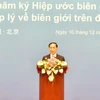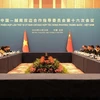A seminar was held in Hanoi on January 28 to mark the 70 h anniversary of the late President Ho Chi Minh’s return to Vietnam after living abroad for 30 years to find a way for national liberation.
In June, 1911, Nguyen Tat Thanh, who later became President Ho Chi Minh, left the country at the age of 21 to go to Europe, beginning a 30 year stint of living abroad to seek a way to liberate the nation.
His return to the country on January 28, 1941 began a new period for the country’s revolution as the entire nation prepared for the 1945 August Revolution.
The seminar focused on his strategic vision when choosing the northern mountainous province of Cao Bang as location for nerve-centre of the Party Central Committee – the country’s first revolutionary base.
Others highlights include President Ho Chi Minh’s involvement in mobilising the revolutionary masses – a key element which contributed to the success of many uprisings. He saw training as the root of success in the building of the revolutionary armed forces as well as the preparations for the future struggle to seize power. In information work he spread the Party’s guidelines and policies to revolutionary movements and concentrated on building the Party up./.
In June, 1911, Nguyen Tat Thanh, who later became President Ho Chi Minh, left the country at the age of 21 to go to Europe, beginning a 30 year stint of living abroad to seek a way to liberate the nation.
His return to the country on January 28, 1941 began a new period for the country’s revolution as the entire nation prepared for the 1945 August Revolution.
The seminar focused on his strategic vision when choosing the northern mountainous province of Cao Bang as location for nerve-centre of the Party Central Committee – the country’s first revolutionary base.
Others highlights include President Ho Chi Minh’s involvement in mobilising the revolutionary masses – a key element which contributed to the success of many uprisings. He saw training as the root of success in the building of the revolutionary armed forces as well as the preparations for the future struggle to seize power. In information work he spread the Party’s guidelines and policies to revolutionary movements and concentrated on building the Party up./.



















